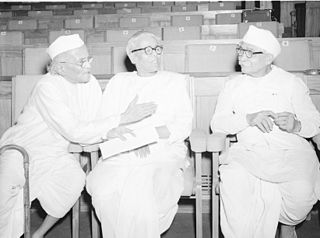
Alexander Kinloch Forbes was a colonial administrator in British India.
Ranchhodlal Chhotalal, Rai Bahadur was a pioneer of the textile industry in Ahmedabad, Gujarat, India. He is considered as founder of modern Ahmedabad and was also a social activist.
Gujarat Sahitya Sabha, originally called the Social and Literary Association is a literary institution for the promotion of Gujarati literature located in the city of Ahmedabad, India. It was founded by Ranjitram Vavabhai Mehta in 1898. Its name was later changed in 1905.

Keshavram Kashiram Bambhaniya also known as k.k.shastri born on 28 July 1905 at Mangarol in Junagadh district, Bombay Presidency. He was the founding leader of the Vishwa Hindu Parishad. He was among the dignitaries who attended the first meeting of VHP in 1964 and since then continuously associated with the VHP work and was head of the Gujarat unit also.

Narmadashankar Lalshankar Dave, popularly known as Narmad, was an Indian Gujarati-language poet, playwright, essayist, orator, lexicographer and reformer under the British Raj. He is considered to be the founder of modern Gujarati literature. After studying in Bombay, he stopped serving as a teacher to live by writing. During his prolific career, he introduced many literary forms in Gujarati. He faced economic struggles but proved himself as a dedicated reformer, speaking loudly against religious and social orthodoxy. His essays, poems, plays and prose were published in several collections. His Mari Hakikat, the first autobiography in Gujarati, was published posthumously. His poem Jai Jai Garavi Gujarat is now the state anthem of Gujarat state of India.

Nanalal Dalpatram Kavi was an Indian writer and poet in Gujarati language of Gujarati literature. His name is sometimes spelled as Nhanalal.

Dalpatram Dahyabhai Travadi was a Gujarati language poet during 19th century in India. He was the father of Nanalal Dalpatram Kavi, a poet.
RB Ranchhodlal Chhotalal Girls High School is a girls high School, located in Ahmadabad, Gujarat, India. It is one of the oldest girls school of the country.

Jaishankar Bhudhardas Bhojak, better known by his theatre name Jaishankar Sundari , was an Indian actor and director of Gujarati theatre. Starting at the young age, he rose to fame for his roles of female impersonator in early Gujarati plays. He retired from acting in 1932 but returned to theatre direction and teaching in 1948. He directed and acted in several successful plays. He was awarded the Ranjitram Suvarna Chandrak in 1951 and the Padma Vibhushan in 1971.

Dewan Bahadur Keshavlal Harshadrai Dhruv, also spelt as Keshavlal Harshad Dhruva and known by his pen name Vanmali, was a research scholar, philologist, critic, editor of Middle and Old Gujarati works, and translator of Sanskrit classic poetry and plays from India. He was a professor of Gujarati and taught at Gujarat College. He headed several literary organizations.

Vrajlal Kalidas Shastri was a pioneer of philology in Gujarati language and writer who wrote books on Gujarati language.

Vidyagauri Nilkanth was an Indian social reformer, educationist, and writer. She was also one of the first two women graduates in Gujarat.

Buddhiprakash is a Gujarati language magazine published by Gujarat Vidhya Sabha, Ahmedabad, India.

Ramnarayan Vishwanath Pathak was a Gujarati poet and writer from India. Profoundly influenced by Gandhian thought, Pathak wrote criticism, poetry, drama, metrics and short stories. He edited and translated literary works. He was appointed the president of Gujarati Sahitya Parishad in 1946. He was awarded the Gujarati literary prizes Narmad Suvarna Chandrak for Prachin Gujarati Chhando in 1949 and Sahitya Akademi Award for Bruhat Pingal in 1956.
Rasiklal Chhotalal Parikh (1897–1982) was a 20th-century Gujarati poet, playwright, literary critic, Indologist, historian, and editor from Gujarat, India. He was the president of Gujarat Sahitya Sabha and was appointed the president of Gujarati Sahitya Parishad in 1964. He received the Sahitya Akademi Award in 1960 for his play Sharvilak. He is also a recipient of the Ranjitram Suvarna Chandrak and the Narmad Suvarna Chandrak.

Diwan Bahadur Krishnalal Mohanlal Jhaveri was an Indian writer, scholar, literary historian, translator, and judge from Gujarat, India. His works have been published in Gujarati, English, and Persian. Jhaveri served as president of the Gujarati Sahitya Parishad from 1931 to 1933.

Râs Mâlâ: Hindoo Annals of the Province of Goozerat, in Western India is a 1856 historical work by British colonial administrator Alexander Kinloch Forbes. Divided in two volumes, the work has four sections documenting the history and chronicles from 8th century Gujarat to arrival of British and folk literature of Gujarat as well as an historical account of the place and people he came to know during his stay in Gujarat. It was later translated into Gujarati in 1869.
Hariprasad Gangashankar Shastri was an Indian scholar, historian, epigraphist, Indologist and editor primarily known for his work on the political and cultural history of Gujarat state. He spent much of his career at the B. J. Institute of Learning and Research, Ahmedabad, as a lecturer, professor, deputy director and then as director.

Durgaram Manchharam Dave (1809–1876), popularly known as Durgaram Mehta or Durgaram Mehtaji, was a Gujarati social reformer, essayist, diarist and teacher from British India. Along with his companions he founded the Manav Dharma Sabha, the first reform association of Gujarat, at Surat in 1844, and pioneered social reform activities in Gujarat. He was the first to use autobiographical writing in Gujarati literature by keeping minutes of the transactions of the Manav Dharma Sabha with his comments and views.

Mansukhram Suryaram Tripathi was a Gujarati essayist, biographer, and thinker from British India. He led a conservative school of Gujarati writers who advocated avoiding the use of foreign words in writing and speaking, and promoted the use of Sanskrit or Sanskritised words. He was a cousin of the Gujarati writer Govardhanram Tripathi.
















